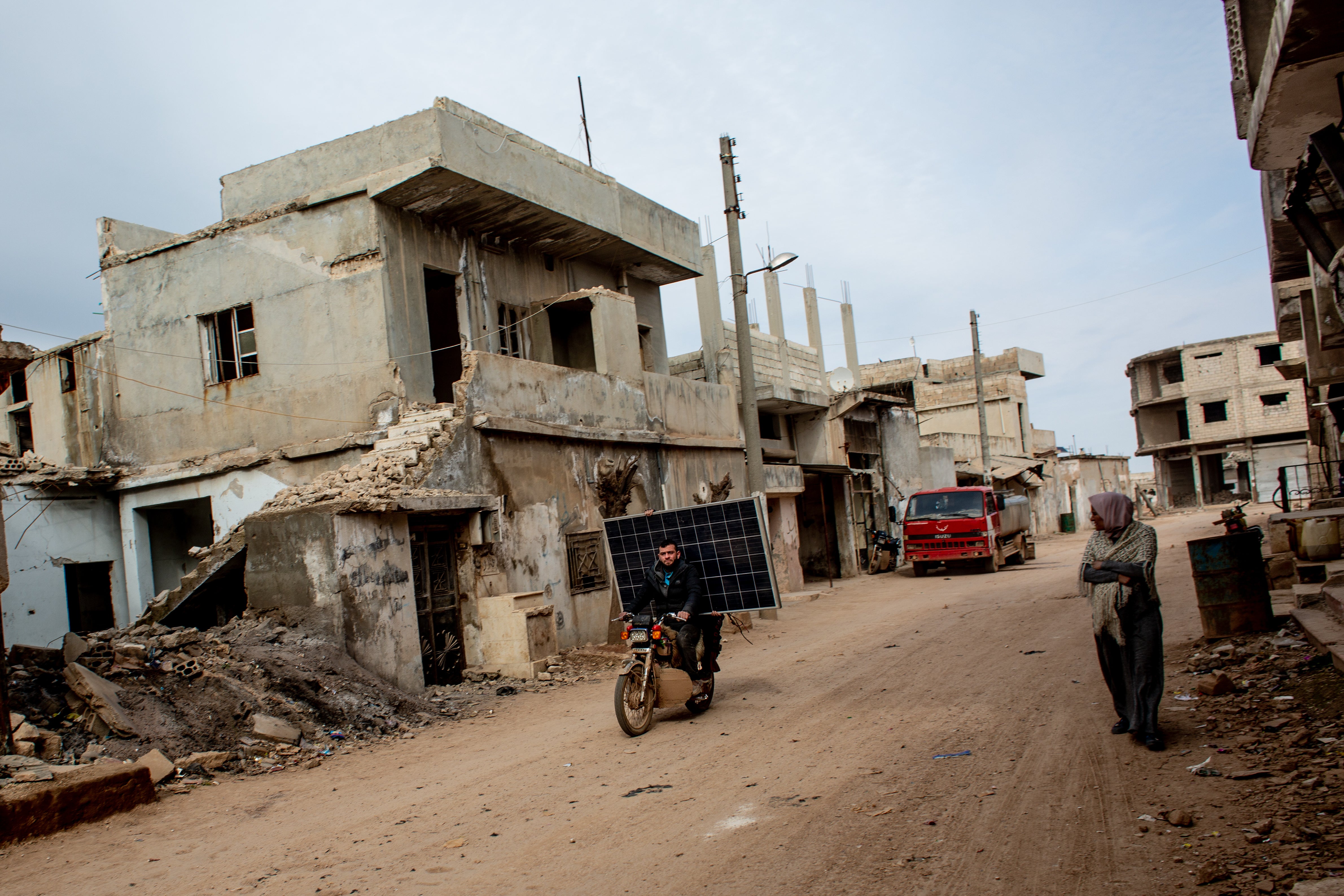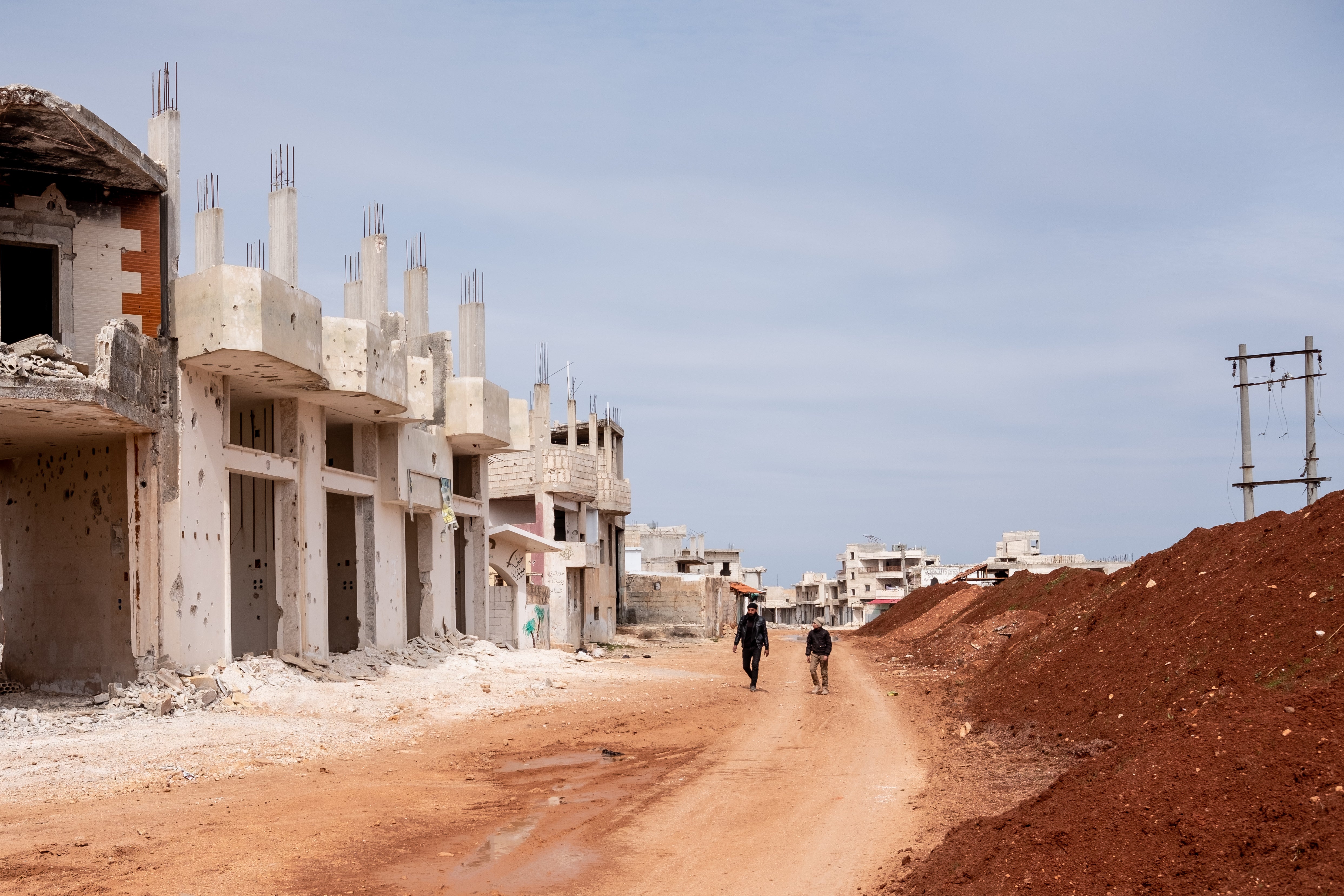Living in a ruined town on the front line, Syrians know hell on earth
Civilians in Afes argue that it is better than living in the camps; at least there is something like a roof over your head when it rains, snows, or the heat becomes overwhelming, writes Borzou Daragahi


It was once a schoolhouse, filled with laughing children, scolding teachers, well-worn textbooks and chalkboards. Now it is a rotting, bombed-out, skeletal husk of a building, littered with debris.
This was once a neighbourhood – an up-and-coming, middle-class enclave in rural Idlib province, home to perhaps 3,000 people. Now it is mostly piles of rubble and twisted concrete slabs. There was once a thriving market, with vendors selling pastries, hardware and children’s clothes to the several thousand people who lived in this Syrian town.
Now there is but one tiny grocery store, operated by Hossein, a 46-year-old man who is the de facto mayor for the 400 people or so who live in the ruined remains of Afes, a town on the front line between rebel fighters in northwest Syria and regime forces loyal to dictator Bashar al-Assad to the south.
None of the houses are intact, and many have roofs that are partially caved in. There is no running water, operative sewage system or electricity, Hossein explains, though some people have set up makeshift solar panels. Although there has been a two-year ceasefire, violations are common, and on 27 February, just weeks before our visit in March, two men were killed and two injured by incoming fire.
“Every single day there are mortars that land here,” he says. “If you want to rebuild a house, you can. But why would you rebuild if all your work could be wiped out in a second?”
The UK is seeking to send those escaping war and deprivation across the world to the African nation of Rwanda, in a much-derided scheme aimed at preventing refugees and asylum seekers from making the dangerous trek to Europe and across the English Channel. Afes is an example of what might befall those who decide not to make that journey; to stay put and try to eke out a precarious life in a literal hell on earth.

That people live in Afes is a sign of how desperate they are. Many fled their homes because of Russian airstrikes and Syrian regime artillery. They arrived in Idlib province, a rebel-held area that is considered somewhat under Turkey’s protection. They spent months sheltering in tents or even caves before they made their way to this town on the very edge of the rebel-held territory. They arrived here, crawled into one of the remaining crevices, and call this place home, because they have very little choice.
Northwest Syria’s Government of National Salvation technically oversees Afes, but no officials dare visit for fear of being struck by rockets.
“The government is very afraid for the families there,” Ahmed Firas al-Lush, a member of the Idlib city council, said in an interview. “It tried to convince them not to live there, as there are daily attacks. As a government, it cannot provide public services to the front line. It is dangerous for the government, civil servants and for the families – even the charitable organisations and doctors won’t work there.”
But civilians who live in Afes argue that is better than living in the camps; at least there is something like a roof over your head when it rains, snows, or the heat becomes overwhelming.
Hossein, the shopkeeper, is among those who have lived their whole lives in the town, departing when the shelling got intense, and returning last year when it simmered down. His 12-year-old son Mohammed works in his shop; he will not allow him to go to a school that operates nearby for fear he will be hit by a mortar on the way home or while walking to class.
“I prefer,” he states firmly, “to keep my boy with me.”
To keep up to speed with all the latest opinions and comment, sign up to our free weekly Voices Dispatches newsletter by clicking here
Farmer Khaled Assad Massoud, 60, moved his family here a year ago, after being forcibly displaced by Assad regime gunmen from his hometown, Sahl al-Ruj, which is in a lush agricultural district. He admits he is a squatter, and is not sure who the home he lives in belongs to. They abandoned it years ago. Massoud uses plastic sheeting to cover the windows, gathering blankets for cold nights.
“It’s very rough living,” he says. “But at least we don’t have to pay for the house we live in.”
All across Idlib province, there has been an economic revival of sorts as a ceasefire brokered between Russia, Turkey and the Syrian regime has stretched on for more than two years. The families that have relocated to Afes came because they could not bear living in tents, and had lost their means of income to be able to afford to pay rent. “We are all in very bad situations,” says Masoud, a 27-year-old living in Afes with his family.
Afes has been utterly destroyed by the war. Bombing has shattered every single window in the town. Yet signs of life persist. A shepherd and his family lead their flock through the muddied dirt roads. Children run outside to wave at passing cars. Drying clothes hang from windowsills.
Inside one former shop in what was once the high street, someone has set up a mini-football table, and two young men play, laughing as they knock the tiny ball back and forth in a rare note of joy amid the grim landscape.






Join our commenting forum
Join thought-provoking conversations, follow other Independent readers and see their replies
Comments